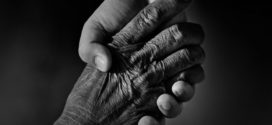Shame is the universal companion of women, nipping at our heels, feeding on our deepest fear that who we are is not enough. Shame is beyond annoying. It is debilitating. In order to unpack the shame that is immobilizing us from living our best life and from accessing our true power, we must analyze it like a glass slide under a microscope.
I have always been acutely aware that there was a dry rot somewhere inside of me. I knew it because when anxiety and depression would come knocking at my door, the fumes of decomposition filled my nostrils and I would look around and realize there was no one else around, no one else to blame.
I tried to pray the rot away, turned to Jesus and gave up secular music for months at a time, always falling into relapse. Sometimes I turned to self-flagellation and scratched the inside of my thighs with paper clips or dull scissors. Once, after my tia reprimanded me for something minor, I went into her bathroom and smacked my head against the ceramic wall one hundred times. I whisper counted out loud. I was nine years old when I walked out with a swollen chichón on my forehead and told her she didn’t have to worry because I had already punished myself. Lucky for me, it didn’t leave a visible scar.
I knew the rot existed and treated it here and there like one would water a plant they don’t really care for. I participated in superficial self-care routines that included candle-lit bubble baths, homemade facials and rationalizing the end of a chain of monogamous relationships because I needed to “focus on me.” Which I did – for a whole few weeks before I found myself settling down with the next distraction.
I didn’t realize the depth of the trauma and the correlated shame until I got married.
Intimate relationships of any kind are like a mirror. And marriage is like a double-sided vanity mirror with HD lighting that gives you the realest reflection you’ve ever encountered. Every blemish is magnified. Living so closely with another human being, you start to see what you really look like. And it’s looks nothing like the photo-shopped wedding pictures.
For the first three years of being married, I would cringe whenever I heard someone talk about how their loneliness dissipated after finding their soulmate. Their fairytale love anecdotes made me feel like my love was counterfeit. I would lay in bed replaying fantasies of a perfect love where one person fulfills an endless list of needs and the loneliness worsened. I was suffering but I didn’t speak up. I didn’t know how to say what was on my mind without freezing. I was stuck in the space between “I wish I could just wake up alone” and “I can’t stand this bed getting any colder.” I started to wonder if maybe I had made a mistake.
The start of our decline was gradual and composed entirely, at first, of minimal offenses. Someone half-listening while texting and checking social media or prioritizing the never-ending grind for money over date night. The other someone not attempting to talk as much and going to sleep alone or showing little interest in shared activities. Small stuff, nothing to sweat. But how quickly small offenses morph into reasons for divorce. Neglect, financial strain, lack of intimacy and the loss of friendship. And I couldn’t see the role I played in all of this because I was too busy trying to shove the mirror back in my husband’s face so that he could see all of his flaws.
The truth is a chalky, oversized pill to swallow.
No one talked to me about failing in their marriage. After I published one of my most personal essays on the hardships of marriage, I had a cousin text me, “I remember when your parents almost got a divorce.” I froze, with the phone in hand, wondering how I hadn’t known that my parents had gotten that close to the end. None of the women in my life warned me about the danger of silence in marriage and the importance of individuality. I mean they gave me the cliché, “Marriage is hard work” nonsense, but they didn’t cover the nitty-gritty. They didn’t tell me about the nights I would spend crying myself to sleep or the loneliness that would consume me as I learned my partner, but more importantly as I learned myself.
For a long time, I thought the difficulties in my marriage were a manifestation of my shortcomings. I’ve come to accept that we both failed to meet each other’s expectations. I’ve forgiven myself for my actions and inactions, even embraced it for what it is. How could I have been expected to defend, support, encourage and love another human being when I wasn’t capable of doing that for myself? I was ashamed that I had failed him, not even recognizing that I had failed myself first. That lack of self-awareness was instilled in me from early on.
I watched my mother live for her family. My father tried to give her breaks by scrubbing the house while she was out and taking care of the dishes after each meal, but she was relentless. Without anyone ever asking her to, she placed the pressure on herself to do the shopping and the couponing, the cleaning and the laundry, the hot dinners and packed lunches, the childcare and the transportation, the discipline and the nurturing. Her arms grew tired and she always fell asleep before eight on the couch, but she never asked for help.
I watched her take on the world without ever practicing an ounce of self-care. And I internalized the message that it was my responsibility to do the same in order to become a good wife and mother.
It is too common practice to teach young brown girls to serve others before serving themselves. After watching all the women gathered in the kitchen preparing the meal at family functions, they are trained to serve the men plates before anyone else. We teach our girls to people please. The teachers are always right, the elders are forever wise and they should hold their tongue lest they are considered rebellious and wild.
And that swallowing of the tongue creates a cesspool of silence where shame is cultivated. The shame that we shove onto our backs for years until we have accumulated a backpack that weighs more than we do and keeps us bent over, unable to see anything but the floor beneath our feet.
Therapy has helped me lighten the load on my back. I had attributed the decline of my marriage to my inadequacies and insecurities. Like many women, the cloak of shame covered me and made me believe it was all my fault. If only I had … Now I’m able to grasp the reality that while yes, I hurt my husband, he was broken long before I came into the picture. No matter how confident and self-assured he presents, he has his own set of traumas and shame. We all do. We’ve learned tools in marriage therapy to communicate without inflicting more pain on each other. And we are both taking steps to face our individualized damage, the dry rot that exists in everyone.
Learning how to set boundaries and foster emotionally healthy relationships have played a role in keeping the load off. I thought I had to be everything for everyone. That I had to pull up all the friends and family that were flailing beside me. Learning how to say no has saved my life and my marriage. I have learned that it is not my job to heal everyone that enters my life. I have learned to protect my energy and the energy of my household by any means necessary. I have learned that it is okay to change my mind, to cancel commitments, to not answer that call or text, to speak up, move on, let go and change. And if any of those decisions bother someone else, that is their problem, not mine. I don’t owe anyone any explanations.
Owning my flaws instead of behaving as though they don’t exist and a steady practice of forgiving myself has helped me not be so crippled. Investing as much time in getting to know myself as I’ve taken to get to know others has been transformative. I understand that I’m an extremist by nature and that while it can be beneficial when I’m going hard to reach my goals, I need to monitor myself and aim for more balance. Sometimes my body freezes when I want to say “no.” I am digging into the wound that made my body believe it has to dissociate in high-stress situations. And when I back paddle, as I’ve done and will do in the future, I show myself the empathy I so freely hand out to others.
My posture is a lot better these days. Sometimes I have to remind myself to straighten up, the ghost of the shame backpack still weighing on my body, but I have to say I like walking tall. I enjoy being able to see more than just the floor beneath my feet.
More than just all the effort we’ve been putting into making our marriage work and I’ve been putting into healing, a major component of unpacking the shame has been a willingness to be transparent. Sometimes people ask us what marriage is like and we look at each other before responding at the same time. “Hard,” we say, with smiles on our faces. People, even married couples, usually give us a puzzled reaction. As though our saying being married is hard means that something is wrong with us.
Anything worth having takes work. It takes deliberate energy and focused discipline to find joy and make a life together. Despite what the world tries to tell us, there’s no shame in that.
*************************************************************************************************************************
 Nia Ita is an Afroindigina NYC writer navigating life and love. A queen from Queens who often has to readjust her crown – Nia has written for Thought Catalog, YourTango, Elite Daily, Blavity and other online publications. She has also had the honor of being featured for La Pluma y La Tinta’s New Voices reading series. She is currently wrapping up her participation in the #52essays2017 challenge created by Vanessa Martir. Check out her essays at www.niaita.net.
Nia Ita is an Afroindigina NYC writer navigating life and love. A queen from Queens who often has to readjust her crown – Nia has written for Thought Catalog, YourTango, Elite Daily, Blavity and other online publications. She has also had the honor of being featured for La Pluma y La Tinta’s New Voices reading series. She is currently wrapping up her participation in the #52essays2017 challenge created by Vanessa Martir. Check out her essays at www.niaita.net.
 Wendy Angulo Productions
Wendy Angulo Productions







